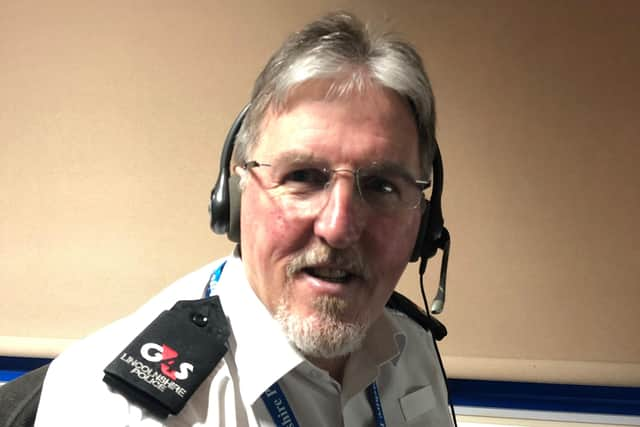A look behind the scenes of Lincolnshire Police's Force Control Room
and live on Freeview channel 276
Acting as the first point of contact between the force and the public, they decide what level of response is required. It’s a tough job and can take an emotional toll on the staff who work long, unsociable hours to keep people safe and make sure officers are well-informed before they arrive at a scene.
And then there’s the smart work they do to avoid any deployment all together – work that flies under the radar and stays within the four walls of the Force Control Room building. The calls they take can be from people ringing 101 or 999.
Advertisement
Hide AdAdvertisement
Hide AdAdele Badiali has worked as a Call Taker for the last five years, having previously worked at Lincoln County Hospital, and was offered a full-time role just six months after she started.


Adele said: “We save lives everyday.
“We can’t let officers go into these situations blind – we get names, dates, places, has the potential offender got weapons, if so, what have they got?
“And a lot of the time we may be speaking to people who are hysterical and are struggling to hold it together – we might even be speaking to people who have chosen to follow the perpetrators.
"We’ve got to decide what’s required and get that out there as quickly as possible to keep the public safe. We get elderly people who call in who need help and advice that isn’t always linked to the police. People think it’s all dramatic phone calls – but it’s not and sometimes the best work we do goes unseen and doesn’t require deployment.”
Advertisement
Hide AdAdvertisement
Hide AdCall Takers are required to diagnose a situation in seconds – they have to find out who is calling, why they’re calling, if they’re at risk, what response is required and advise the person what to do next.
But just because a crime has been logged and officers are on the way, it doesn’t mean the work of the call-taker is over; in fact, it might just be the beginning for workers who may have to spend another hour on the phone, calming someone down and making sure they’re okay.
Technology has also changed the role over the past decade, with staff going from one single computer to three screens. What used to be a 30-second logging process now takes around three or four minutes to ensure that officers have all the information they need and that the best level of service is provided.
Paul Holmes has been in the job for 11 years, after having served as a controller in Manchester beforehand. The 63-year-old is no stranger to high pressure situations and experienced horrific situations during several tours of Northern Ireland, but says the job can get to anyone.
Advertisement
Hide AdAdvertisement
Hide AdOne incident he remembers clearly was when a colleague took a call about a serious incident in a Lincolnshire town, which hit the headlines across the country.
Paul said: “The guy who took the call was very resilient – but he came off the phone shaken.
“I am ex-Forces so when you get those type of phone calls, I go into overdrive mode and my training takes over. But it’s not the same for everyone and for some people it is difficult. I just like helping people and helping my colleagues when they start the job – that’s what it’s all about.”
One of the FCR’s youngest Call Takers is Jaedene Mitchell, 20, who has worked there for the last two years. She has always had a passion for the police and jumped at the chance to work as a Call Taker to help people across the county.
Advertisement
Hide AdAdvertisement
Hide AdJaedene said: “I don’t think people realise just how important you are as the first person a member of the public is going to speak to.
“One of the most difficult cases I had was when a woman called us and was just screaming and then suddenly, I heard her say: ‘my baby’s not breathing’.
“This wasn’t really a police call, typically we would take some details and transfer them over to the ambulance service – but in this situation, I felt we didn’t have time. It was too much time in my head. I got her to get the baby over her lap and we managed to get what was stuck in her throat out. She was just crying her eyes out. It’s difficult.”
But it’s not always the calls you expect to have an emotional impact that leave the biggest impression.
Advertisement
Hide AdAdvertisement
Hide AdJaedene said: “It’s often not these really dramatic incidents take their toll on you because you kind of become desensitised to it.
“It’s the call from an elderly woman who’s in the house alone by herself and is just lonely that really hits me hard. It’s those more human calls that get to you.”
If you need the police, use the non-emergency number 101 for situations that do not require an immediate police response.
This will help keep 999 available for when there is an emergency, such as a crime is taking place, or somebody is in immediate danger – for these types of incidents, always call 999.
You can also report a crime online.
Visit www.lincs.police.uk/contact/what-happens-when-you-call-the-police for more.